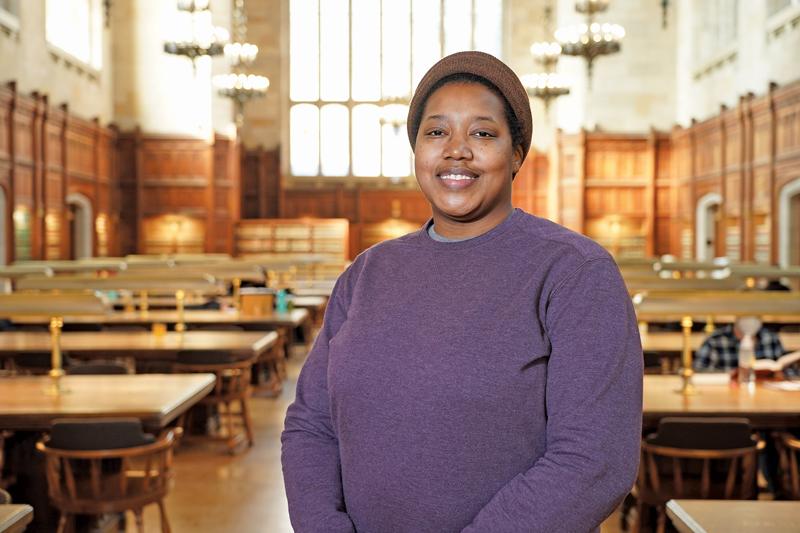Before Jessica Nelson started at the U-M law school last fall, a friend warned her she might experience “impostor syndrome” at a place filled “with people who grew up in prep schools.” His advice: Fake it till you make it.
Despite her pal’s counsel, she’s not a newcomer to elite schools; after a dismal start at Texas A&M, followed by five years in the Marines, she graduated with fine grades from Smith College. But U-M Law looms large, and she’s aware that her slow academic start makes her different–not to mention being black, gay, and a decade older than most of her confident-sounding classmates (she’ll turn thirty-four this month). To shake off any stirrings of impostor syndrome, she gives herself pep talks along the lines of “I can compete, and it doesn’t matter where I came from.”
—
Over coffee at Zingerman’s, Nelson peers thoughtfully over her mask and insists on calling me “ma’am,” explaining quietly, “That’s what we do in the South.”
She grew up in the Houston area, the middle of three kids in a family that respected education: her mother was an elementary teacher, her dad a landscaper who’d gone to college on a football scholarship. But daily life wasn’t easy. Her parents divorced while she was young, and she lived mostly with her mother, who for several years attended grad school at night after teaching all day. “I made her lunches,” Nelson recalls. “She didn’t make mine.”
On her own a lot, Nelson rarely studied–she later would be diagnosed with ADHD–and had terrible grades in high school. She didn’t do much better at Texas A&M, which was one reason she quit after sophomore year to join the Marines. She was also drawn to “the biggest, baddest branch” of the military, as she puts it, by 9/11.
She was thirteen in 2001 and heard about the attacks on the school bus. It was a shock, she says, “to realize that somebody wanted to hurt a country, or an ideal of freedom, so much that they could commit that act of terror.
“I felt like I really wanted to combat that.” She wanted to enlist in high school, “but my mother wouldn’t sign the papers.”
Her five-year stint took her around the world, including stations in Japan, South Korea, and Kuwait. “I like to say I was Google Maps for the military,” she says, explaining that as a “geospatial analyst” she produced maps to get troops in training where they needed to be. In her spare time she volunteered for the USO, setting up Skype sessions for her fellow soldiers.
It was a difficult time personally. After years of struggle, she was just starting to open up about her sexual orientation, but when she enlisted, “Don’t ask, don’t tell” was still in force.
As her discharge neared, a Google search led her to the Warrior-Scholar Project, a nonprofit that helps veterans prepare for college. A few months later, she was in an “academic boot camp” on the Princeton campus. In a week of long, intense sessions, she and a small group of others crammed in reading and discussions about, among other things, Alexis de Tocqueville’s writings on the early United States.
“It was life-changing,” she says, and she emerged confident that she could hold her own in academia. She applied to schools she previously wouldn’t have dreamed of, and Smith was very encouraging, even flying her out at their expense. She graduated in 2019, worked in local government in Jackson, Mississippi, on a Lead for America fellowship, and was Ann Arbor-bound.
—
Of all the variegated strands of Nelson’s identity, “veteran” may be the one most unfamiliar to her classmates. Many, she says, don’t know anyone from their own generation who served. Some ask what Marine boot camp is like (very tough, she tells them, but you do bond with other trainees). Others want to criticize U.S. foreign policy.
She doesn’t get into arguments, she says, “because I do understand where people are coming from.” She herself has grown more “questioning” of U.S. policies since leaving the service.
“I’m proud of everything I did out there,” she says. “But I do wish sometimes I’d been more informed.”
Amid debates about identity politics, Nelson draws on her own carefully considered experiences to discuss racial issues. As a kid, she often spent summers on her father’s parents’ Mississippi farm and heard their painful memories of segregation.
In high school in suburban Houston, she had “friends of pretty much all races.” But white acquaintances sometimes called her an “Oreo,” claiming that “because I speak properly, I wasn’t really black on the inside. And I said, ‘Well, you know, black people can speak properly.'” At Texas A&M, the prejudice came from white classmates who dubbed her “Token,” even posting the taunt on a sign outside her dorm room.
Nelson interned last summer at a big law firm; this year, she hopes to try out public-interest law. She’d prefer to do public interest work after graduation but isn’t sure she can afford it, at least right away.
Whatever her next step, “I’m trying in school to take in as much information as I can,” she says.
“I know that school doesn’t necessarily make you a good lawyer. But, you know, I want to make my future clients proud.”
This article has been edited since it was published in the March 2022 Ann Arbor Observer. The race of the acquaintances who called Nelson an “Oreo” has been corrected.
